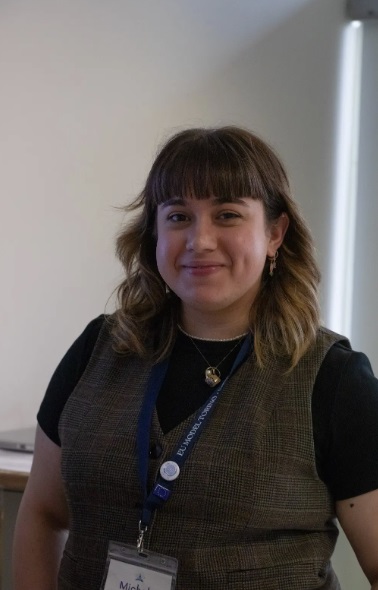Digital Policy Working Group
The EU Digital Policy Working Group aims to make Europe fit for the digital age. As technology evolves at an unprecedented pace, the group focuses on critical areas such as data protection, cybersecurity, artificial intelligence, digital identity, data governance, among others. Through rigorous research, policy analysis, and collaboration with key stakeholders, members aim to contribute to a digital transformation that supports innovation while respecting fundamental rights. Overall, it provides a dynamic platform for navigating complex digital challenges, ensuring that human rights, digital integrity, and climate-neutrality goals are at the forefront of the agenda.
Head of the Working Group – Julia Arenos Karsten

Julia Arenos Karsten has a background in politics and social sciences and has been working in the area of EU digital policy for the past two years. She began as a consultant for the European Commission, contributing to various e-government projects within the European Digital Programme. Later, she joined the European Commission, primarily DG CNECT, first as a Blue Book Trainee and subsequently as a Policy and Legal Officer, which is her current position. Julia is currently part of the team in DG CNECT responsible for implementing the new European Digital Identity framework, focusing on regulatory aspects. These experiences have deepened her understanding of Europe’s evolving digital landscape and inspired her, together with a friend, to found the Digital Policy Working Group.
Deputy – Júlia Castro Boix

Júlia is the Deputy Head of EST’s Digital Policy Working Group. She studied law and completed a Master’s degree in Barcelona. After gaining a year of experience in the private sector, she moved to Luxembourg to undertake a traineeship with the European Court of Auditors, working in the Data Protection Team.
Michela Rossettini

Michela was born and raised in Italy, she got her bachelor’s degree in Law from the University of Turin, she spent one semester abroad at McGill University and one at Bergen University. Her bachelor’s dissertation focused on the intersection between gender and cybercrime and what are the effects of AI on women’s lives, especially within the context of pop culture. She volunteers for a youth-led association that advocates for inclusive participation of young women in politics. She’s currently pursuing a Master’s degree in International and Development Studies in the track of Gender, Race and Diversity at the Geneva Graduate Institute.
Matilde Serrau

Matilde is an Italian graduate with a Master’s degree in International Relations, majoring in Diplomacy, from LUISS Guido Carli University. Her academic journey, which has taken her through Italy, Canada, and Spain, has equipped her with proficiency in four languages Italian, English, French, and Spanish, enhancing her professional and personal interactions.
Currently, she works in a company where she focuses on Environmental, Social, and Governance issues within a highly international team, using English, French, and Italian as her working languages.
Her passion for digital policies was sparked by her thesis on geopolitics, population, and technology, which has led her to become a member of the working group on digital policies at the European Student Think Tank. She is also deeply interested in human rights, sustainability, and gender equality.
Beyond academics, Matilde has a strong interest in cinema and theater, and she is fascinated by journalism and documentary filmmaking, which offer unique insights into the human experience.
Maria Stoikou

Maria is a dedicated researcher at the European Student Think Tank (EST), skilled in harnessing interdisciplinary perspectives to address complex challenges in digital policy. With a Master’s degree in Comparative Criminal Justice from Leiden University and currently pursuing an MPA in Economics and Governance, Maria brings a unique blend of legal and economic expertise to her research. Her work at EST focuses on Digital Policy, exploring the intersections of technology, law, and society. Maria is passionate about how Law and Policy-Making can bring better results in the society and is committed to using her research to inform evidence-based policymaking and promote a just and equitable digital future.

 The ’Ndrangheta’s Infiltration and Threat to European Institutions
The ’Ndrangheta’s Infiltration and Threat to European Institutions  From Paper to Practice: How Grassroots Norms Undermine Gender Rights in Pakistan
From Paper to Practice: How Grassroots Norms Undermine Gender Rights in Pakistan  Exploited Childhoods: The Role of Global Corporations in Perpetuating and Mitigating Child Labour
Exploited Childhoods: The Role of Global Corporations in Perpetuating and Mitigating Child Labour  Human Rights Challenges in Addressing SLAPPs in Media, NGOs and Journalism in the EU
Human Rights Challenges in Addressing SLAPPs in Media, NGOs and Journalism in the EU